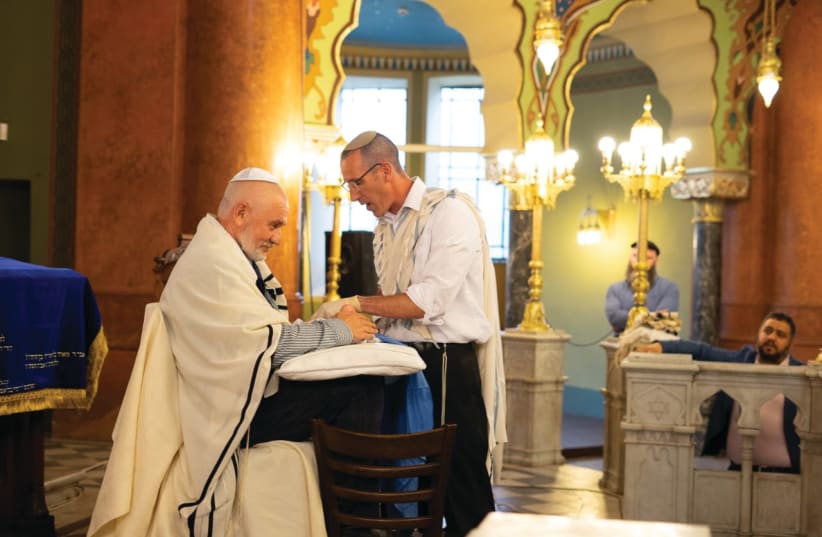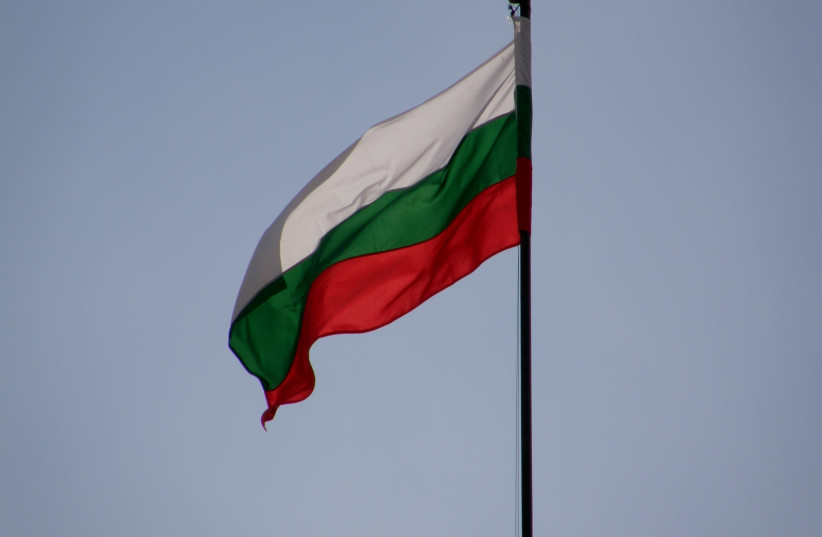I spent last Shabbat in Bulgaria. I was blessed to have a circumcision (brit milah) in Sofia on Friday and there were no direct flights to Ben-Gurion Airport after the event, so making it back before Shabbat wasn’t an option. A rare treat for me because I usually only get 24 hours in any given location when I travel abroad for work.
The brit milah itself was amazing. The Synagogue (as it’s known to the locals) is a fantastic structure consisting of a huge sanctuary with a massive dome, towering over the space. My custom is to sing throughout the ceremony, and the acoustics were beyond belief. I could have sung there for hours. In addition to the space, the entire Jewish community joined in the celebration. From Chabad to secular – everyone was there. It’s one of the reasons I love what I do.
Beyond the event itself, I met the most amazing people. The parents of the baby are refugees from Ukraine having only settled in Sofia in the past few weeks. The Jewish community of Sofia helped the family organize the event, bringing me in from Israel. It’s not every day my work involves helping Jews in these situations.
In addition to connecting with the family of the baby, there were people from all over the world participating in the Shabbat experience. There were some Israelis, local Bulgarians and even a visiting businessman from Zurich. At times throughout Shabbat, announcements were made as to what the common language would be. Even though many of those in attendance had never been residents of Israel, they spoke fluent Hebrew. As an American by birth, I was blown away. I can’t imagine what I would have done if my childhood shul had announced that “now we’re all going to speak Hebrew.”
As is the case with most European shuls, the synagogue has very tight security. I was instructed by the ritual director to wait at the backdoor of the building on Shabbat morning and he would meet me there. I arrived a bit early and waited with my hood on because it was raining. When the ritual director opened the door, he said security was up in arms because a sketchy-looking character was trying to get in the backdoor. Apparently, they weren’t too concerned because they sent the ritual director alone to get me.
Another constant on this trip was every time I left the synagogue the security staff would point to their heads. The purpose was to let me know I was “exposed.” There are two practices in this community – either the male members of the community only wore a kippah on the grounds or those who wear a kippah regularly put a hat on when walking the streets. Every time the guards pointed to their heads I would politely nod mine and continue on my way with an exposed kippah.
WHEN THE local Jews saw the behavior of the security guards, each commented to me that I wasn’t in any danger. “There may be people who don’t like Jews here but they’re not going to ruin their life over it.” So, I spent my time in Sofia getting many weird stares but nothing more than that. After Shabbat ended, I mentioned this back and forth to my wife and she remarked that I really should start traveling with a hat.
My return flight happened to be through Turkey, not a place most Jews are running to in the present climate. On my way to the airport, I thought of the security guards and my wife’s comments wondering what I’d do without a hat. I chose not to change my status quo and left my kippah on. I’m so glad I did.
As I approached passport control I was greeted with a “Shalom habibi!” (“Hello, my dear friend!”) The woman behind the counter and I held an entire conversation in Hebrew – and she wasn’t Jewish. I inquired, “Where did you learn Hebrew?” She told me she has close friends in Tel Aviv and she loves the Jewish people and Israel. I implored, “You must visit!” She promised me she would someday.
I made my way to my gate and sat down as a Bulgarian soccer team arrived for the same flight. It was an impressive group. It must have been 50 players. Suddenly I heard “Mah nishmah ahi?” (“What’s up my brother?”)
This player and I struck up a conversation. He told me that not only was he the only Israeli player but he also had yet to make any connection with the Jewish community in Sofia. I promptly gave him all the phone numbers I had for the Jewish communal leaders in the area.
My travel experience did have one downside. As I waited to board the plane, two black men sat nearby. Keep in mind we were well past the security checks that allow one on the plane. Two security officers approached my neighbors and demanded to see their documentation. One of the two African gentlemen got very upset. He reprimanded the officers noting that there was no need to check them at this point and that this was nothing more than racial profiling. He was right. The officers hadn’t even tried to cover their actions by checking anyone else in the vicinity. It pained me to watch. I wished I could have done something.
That’s when I realized why I don’t cover my kippah. It’s for all of the above reasons. If I had taken off my kippah I never would have met any of the amazing people I did. But beyond that, as much as there are dangers out there, it doesn’t feel right to abandon our black brothers and sisters. They can’t take off their skin color or put a hat over that which makes them different. We Jews are also part of “the other” and we have to stop hiding it. It’s sad that we still live in a world where any of us has to worry about being marked in this way but the reality will only change if we stop hiding who we are.
The writer is an Efrat-based rabbi, mohel, wedding officiant and member of a private religious court. He performs circumcisions and conversions all over the world and is the founder of Magen HaBrit, an organization protecting both brit milah and the children who undergo it.

